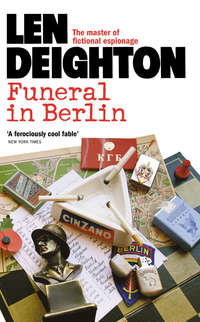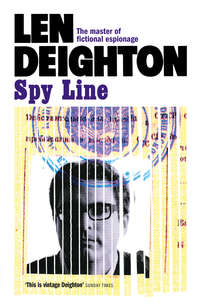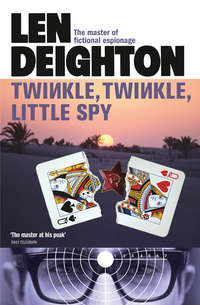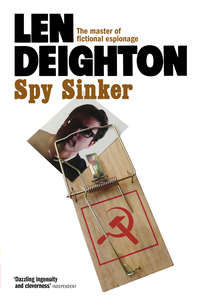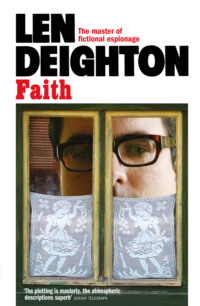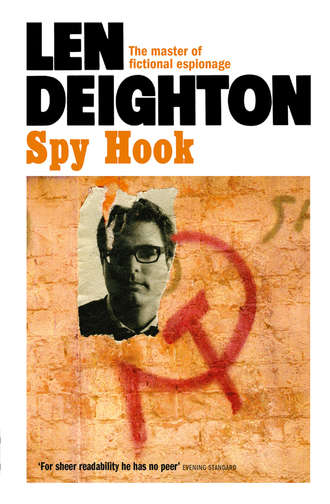
Полная версия
Spy Hook

Cover designer’s note
When considering how I might illustrate the cover of the first part of this second trilogy of spy novels, where the KGB loom large, I thought that the sickle part of the Communist symbol (representing unity of peasants and workers) would make the perfect visual analogy for a hook. In use since 1917/18, the Hammer and Sickle became the official symbol of the Communist party in 1922.
Some years ago, I photographed a graffiti image of the emblem on a wall in Italy. As the surface seemed to lack the rough texture that I was after, my wife – who can work wonders on the computer – superimposed the communist motif over one of my photographs that I had taken of the Berlin Wall from the eastern side at the time of its downfall. (I also took the opportunity to join the jubilant crowd in standing atop the wall.)
By impaling the photo of Bernard Samson on the point of the sickle I could suggest how the KGB were getting their hooks into poor Bernard as he tries to navigate the maze of deception and betrayal in this wonderful story.
The vignette on the back cover features two postcards of Berlin from the Cold War era, plus a metal souvenir of the Brandenburg Gate, potent symbols of a city so familiar to Bernard, and which may prove his saviour or his downfall.
At the heart of every one of the nine books in this triple trilogy is Bernard Samson, so I wanted to come up with a neat way of visually linking them all. When the reader has collected all nine books and displays them together in sequential order, the books’ spines will spell out Samson’s name in the form of a blackmail note made up of airline baggage tags. The tags were drawn from my personal collection, and are colourful testimony to thousands of air miles spent travelling the world.
Arnold Schwartzman OBE RDI
LEN DEIGHTON
Spy Hook


This novel is entirely a work of fiction. The names, characters and incidents portrayed in it are the work of the author’s imagination. Any resemblance to actual persons, living or dead, events or localities is entirely coincidental.
Published by HarperCollinsPublishers Ltd
1 London Bridge Street
London SE1 9GF
www.harpercollins.co.uk
First published in Great Britain by Hutchinson Ltd 1988
Copyright © Pluriform Publishing Company BV 1988
Introduction copyright © Pluriform Publishing Company BV 2010
Cover designer’s note © Arnold Schwartzman 2010
Cover design and photography © Arnold Schwartzman 2010
Len Deighton asserts the moral right to be identified as the author of this work
A catalogue copy of this book is available from the British Library
All rights reserved under International and Pan-American Copyright Conventions. By payment of the required fees, you have been granted the non-exclusive, non-transferable right to access and read the text of this ebook on screen. No part of this text may be reproduced, transmitted, down-loaded, decompiled, reverse engineered, or stored in or introduced into any information storage and retrieval system, in any form or by any means, whether electronic or mechanical, now known or hereinafter invented, without the express written permission of HarperCollins ebooks
HarperCollinsPublishers has made every reasonable effort to ensure that any picture content and written content in this ebook has been included or removed in accordance with the contractual and technological constraints in operation at the time of publication
Source ISBN: 9780586068960
Ebook Edition © MARCH 2015 ISBN: 9780007395361
Version: 2017-05-23
Contents
Cover
Cover Designer’s Note
Title Page
Copyright
Introduction
Chapter 1
Chapter 2
Chapter 3
Chapter 4
Chapter 5
Chapter 6
Chapter 7
Chapter 8
Chapter 9
Chapter 10
Chapter 11
Chapter 12
Chapter 13
Chapter 14
Chapter 15
Chapter 16
Chapter 17
Chapter 18
Chapter 19
Chapter 20
Chapter 21
Chapter 22
Keep Reading
About the Author
By Len Deighton
About the Publisher
Introduction
The Game, Set and Match trilogy made a continuous story. To underline this construction Berlin Game started with Bernard and his friend Werner sitting in a car at Checkpoint Charlie. The third book, London Match, ended with the two men sitting in a car, talking about that previous occasion. But I didn’t want to continue the books, writing another story and then another. I didn’t want to produce a series of books; I wanted a sequence of different books about the same people. I wanted each book to be important and complete and as good as I could make it. To do this I decided I must break away after that first trilogy. No matter that I had drawn up a big master plan; a chart to guide me and a card index for the characters, I wanted to go away and live (with my family) in a different environment so that I could sit back and think and look afresh at the nine-book project.
I found my new environment but I did not sit idle. I drafted a completely different book that would take a lot of time and energy. I decided that I must complete it before I started writing the second trilogy. A prequel seemed a valuable addition and almost a necessity. There were so many things I wanted to say about the characters that surround Bernard, especially the elderly ones. My story would have to cover a long period. While Bomber – the only big book I had written – was a story lasting just 24 hours; the action in the new book would take half a century. I decided to call it Winter.
Much of Winter was already in my mind as noted extensions from the existing characters. If the story was about the twentieth century it must start on the final evening of 1899. A great deal of research was needed as well as planning. When I say research I am not talking about leafing through printed material, although that too is essential. Research is primarily travelling and seeking out and talking to first-rate sources. Bomber had been a complex construction; I kept strictly to the chronology of the bombing mission (but mixed the various action sequences by moving from place to place and from aircraft to aircraft). Winter would also be a chronological story but it had to conform to the chart and my overall plan – and all the biographical characterizations – for nine Samson books (three of them already published).
Writing Winter was a formidable task. As soon as it was complete it was time to start writing the second trilogy, starting with this one: Hook. Characters from Winter emerge. Bernard is three years older than he had been at the end of Match. We see his slight but steady deterioration. The changing environments, and different people he finds there, bring emphasis to Bernard’s obsessional behaviour.
On the other hand, his relationship with Gloria has become more intense and more domestic. And Bernard – a loner and introvert because of the nature of his work – really yearns for a settled and stable home life. Gloria knows this but her feminine wisdom cautions her about voicing this in ways that might make Bernard feel trapped. Gloria does not try to replace the serious, accomplished intellectual that is Bernard’s absent wife: Fiona. Gloria personifies the happy recklessness of youth that Bernard has lost. And Gloria completely understands Bernard’s yearnings for stability, because she too feels she belongs nowhere.
‘Living like a king in France’ is a common German description of ultimate luxury. In proof of their sincerity the Germans have invaded and occupied their neighbour in 1870, 1914 and again in 1940. When Bernard Samson goes searching for Lisl Hennig’s sister the war is long past and she is living in comfort in Provence. But Bernard gets far more than he bargained for.
The story begins with a conversation and poses a question which takes over his life. It is not in line with his work or his orders but that only inflames his curiosity. As the story progresses we share Bernard’s anxieties and almost share his obsessions. Is Fiona involved in a massive financial swindle? It becomes essential for Bernard to believe his wife is not only a defector but personally dishonest and disloyal and a thief too. Only by proving this to his masters and to himself will Bernard be able to shed, or at least soften, the deep feelings of guilt he has about being in love with the much younger, and sometimes childlike Gloria. It is the depth of his love for Gloria that makes his quest so important to him. This is not a casual affair; Bernard is not a bed-jumper. He is a man who keeps his emotions tightly under control, which is why he is so good at his work. And Bernard has voiced his contempt for men such as Stinnes and women such as Zena. Bernard is a prude or maybe a romantic, as Gloria delights in telling him he is.
There is no escape from the deft twists and turns in which both friends and enemies deflect his requests, deny his conclusions and refuse to help him. Is he unreasonable? Sometimes. Is he unbalanced? Maybe. Is he the sort of man we can rely on, and is he everything good a man can hope to be? Yes, he is. Or at least I think so.
Len Deighton, 2010
1
When they ask me to become President of the United States I’m going to say, ‘Except for Washington DC.’ I’d finally decided while I was shaving in icy cold water without electric light, and signed all the necessary documentation as I plodded through the uncleared snow to wait for a taxi-cab that never came, and let the passing traffic spray Washington’s special kind of sweet-smelling slush over me.
Now it was afternoon. I’d lunched and I was in a somewhat better mood. But this was turning out to be a long long day, and I’d left this little job for the last. I hadn’t been looking forward to it. Now I kept glancing up at the clock, and through the window at the interminable snow falling steadily from a steely grey overcast, and wondering if I would be at the airport in time for the evening flight back to London, and whether it would be cancelled.
‘If that’s the good news,’ said Jim Prettyman with an easy American grin, ‘what’s the bad news?’ He was thirty-three years old, according to the briefing card, a slim, white-faced Londoner with sparse hair and rimless spectacles who had come from the London School of Economics with an awesome reputation as a mathematician and qualifications in accountancy, political studies and business management. I’d always got along very well with him – in fact we’d been friends – but he’d never made any secret of the extent of his ambitions, or of his impatience. The moment a faster bus came past, Jim leapt aboard, that was his way. I looked at him carefully. He could make a smile last a long time.
So he didn’t want to go to London next month and give evidence. Well, that was what the Department in London had expected him to say. Jim Prettyman’s reputation said he was not the sort of fellow who would go out of his way to do a favour for London Central: or anyone else.
I looked at the clock again and said nothing. I was sitting in a huge soft beige leather armchair. There was this wonderful smell of new leather that they spray inside cheap Japanese cars.
‘More coffee, Bernie?’ He scratched the side of his bony nose as if he was thinking of something else.
‘Yes, please.’ It was lousy coffee even by my low standards, but I suppose it was his way of showing that he wasn’t trying to get rid of me, and my ineffectual way of disassociating myself from the men who’d sent the message I was about to give him. ‘London might ask for you officially,’ I said. I tried to make it sound friendly but it came out as a threat, which I suppose it was.
‘Did London tell you to say that?’ His secretary came and peered in through the half-open door – he must have pressed some hidden buzzer – and he said, ‘Two more – regular.’ She nodded and went out. It was all laconic and laidback and very American but then James Prettyman – or as it said on the oak and brass nameplate on his desk, Jay Prettyman – was very American. He was American in the way that English emigrants are in their first few years after applying for citizenship.
I’d been watching him carefully, trying to see into his mind, but his face gave no clue as to his real feelings. He was a tough customer, I’d always known that. My wife Fiona had said that, apart from me, Prettyman was the most ruthless man she’d ever met. But that didn’t mean she didn’t admire him for that and a lot of other things. He’d even got her interested in his time-wasting hobby of trying to decipher ancient Mesopotamian cuneiform scripts. But most of us had learned not to let him get started on the subject. Not surprising he’d ended his time running a desk in Codes and Ciphers.
‘Yes,’ I said, ‘they told me to say it.’ I looked at his office with its panelled walls that were made of some special kind of plastic on account of the fire department’s regulations. And at the stern-faced President of Perimeter Security Guarantee Trust framed in gold, and the fancy reproduction antique bureau that might have concealed a drinks cupboard. I’d have given a lot for a stiff Scotch before facing that weather again.
‘No chance! Look at this stuff.’ He indicated the trays laden with paperwork, and the elaborate work station with the video screen that gave him access to one hundred and fifty major data bases. Alongside it, staring at us from a big solid silver frame, there was another reason: his brand-new American wife. She looked about eighteen but had a son at Harvard and two ex-husbands, to say nothing of a father who’d been a big-shot in the State Department. She was standing with him and a shiny Corvette in front of a big house with cherry trees in the garden. He grinned again. I could see why they didn’t like him in London. He had no eyebrows and his eyes were narrow so that when he grinned those super-wide mirthless grins with his white teeth just showing, he looked like the commander of a Japanese prison camp complaining that the POWs weren’t bowing low enough.
‘You could be in and out in one day,’ I coaxed.
He was ready for that. ‘A day to travel; a day to travel back. It would cost me three days’ work and quite frankly, Bernie, those goddamned flights leave me bushed.’
‘I thought you might like a chance to see the family,’ I said. Then I waited while the secretary – a tall girl with amazingly long red tapering fingernails and a mane of silvery yellow wavy hair – brought in two paper cups of slot-machine coffee and put them down very delicately on his huge desk, together with two bright yellow paper napkins, two packets of artificial sweetener, two packets of ‘non-dairy creamer’ and two plastic stirrers. She smiled at me and then at Jim.
‘Thank you, Charlene,’ he said. He immediately reached for his coffee, looking at it as if he was going to enjoy it. After putting two sweetener pills and the white ‘creamer’ into it, and stirring energetically, he sipped it and said, ‘My mother died last August and Dad went to live in Geneva with my sister.’
Thank you London Research and Briefing, always there when you need them. I nodded. He’d made no mention of the English wife he’d divorced overnight in Mexico, the one who had refused to go and live in Washington despite the salary and the big house with the cherry trees in the garden: but it seemed better not to pursue that one. ‘I’m sorry, Jim.’ I was genuinely sorry about his mother. His parents had given me more than one sorely needed Sunday lunch and had looked after my two kids when the Greek au pair had a screaming row with my wife and left without notice. I drank some of the evil-tasting brew and started again. ‘There’s a lot of money – half a million perhaps – still unaccounted for. Someone must know about it: half a million. Pounds!’
‘Well, I don’t know about it.’ His lips tightened.
‘Come along, Jim. No one’s shouting fire. The money is somewhere in Central Funding. Everyone knows that but there’ll be no peace until the book-keepers find it and close the ledgers.’
‘Why you?’
Good question. The true answer was that I’d become the dogsbody who got the jobs that no one else wanted. ‘I was coming over anyway.’
‘So they saved the price of an air ticket.’ He drank more coffee and carefully wiped the extreme edge of his mouth with the bright yellow paper napkin. ‘Thank God I’m through with all that penny-pinching crap in London. How the hell do you put up with it?’ He drained the rest of his coffee. I suppose he’d developed a taste for it.
‘Are you offering me a job?’ I said, straight-faced and open-eyed. He frowned and for a moment looked flustered. The fact was that since my wife had defected to the Russians a few years before, my bona fides was dependent upon my contract with London Central. If they dispensed with my services, however elegantly it was done, I might suddenly start finding that my ‘indefinite’ US visa for ‘unlimited’ visits was not getting me through to where the baggage was waiting. Of course some really powerful independent corporation might be able to face down official disapproval, but powerful independent organisations, like these friendly folks Jim worked for, were usually hell-bent on keeping the government sweet.
‘Another year like last year and we’ll be laying off personnel,’ he said awkwardly.
‘How long will it take to get a cab?’
‘It’s not as if my drag-assing over to London would make a difference to you personally …’
‘Someone told me that some cabs won’t go to the airport in this kind of weather.’ I wasn’t going to crawl to him, no matter how urgent London was pretending it was.
‘If it’s for you, say the word. I owe you, Bernie. I owe you.’ When I didn’t react, he stood up. As if by magic the door opened and he told his secretary to phone the car pool and arrange a car for me. ‘Do you have anything to pick up?’
‘Straight to the airport,’ I said. I had my shirts and underwear and shaving stuff in the leather bag that contained the faxed accounts and memos that the embassy had sent round to me in the middle of the night. I should have been showing them to Jim but showing him papers would make no difference. He was determined to tell London Central that he didn’t give a damn about them or their problems. He knew he didn’t have to worry. When he’d told them he was going to Washington to work, they’d taken his living accommodation to pieces and given him a vetting of the sort that you never get on joining: only on leaving. Especially if you work in Codes and Ciphers.
So Jim clean-as-a-whistle Prettyman had nothing to worry about. He’d always been a model employee: that was his modus operandi. Not even an office pencil or a packet of paper-clips. Rumours said the investigating team from K-7 were so frustrated that they’d taken away his wife’s handwritten recipe book and looked at it under ultraviolet light. But Jim’s ex-wife certainly wasn’t the sort of woman who writes out recipes in longhand, so that might be a silly story: no one likes the people from K-7. There were lots of silly stories going round at the time; my wife had just defected, and everyone was nervous.
‘You work with Bret Rensselaer. Talk to Bret: he knows where the bodies are buried.’
‘Bret’s not with us any more,’ I reminded him. ‘He was shot. In Berlin … a long time back.’
‘Yeah; I forgot. Poor Bret, I heard about that. Bret sent me over here the first time I came. I have a lot to thank him for.’
‘Why would Bret know?’
‘About the slush fund Central Funding set up with the Germans? Are you kidding? Bret master-minded that whole business. He appointed the company directors – all front men of course – and squared it with the people who ran the bank.’
‘Bret did?’
‘The bank directors were in his pocket. They were all Bret’s people and Bret briefed them.’
‘It’s news to me.’
‘Sure. It’s too bad. If half a million pounds took a walk, Bret was the man who might have pointed you in the right direction.’ Jim Prettyman looked up to where his secretary stood at the door again. She must have nodded or something for Jim said, ‘The car’s there. No hurry but it’s ready when you are.’
‘Did you work with Bret?’
‘On the German caper? I okayed the cash transfers when there was no one else around who was authorized to sign. But everything I did had already been okayed. I was never at the meetings. That was all kept behind closed doors. Shall I tell you something, I don’t think there was ever one meeting held in the building. All I ever saw was cashier’s chits with the authorized signatures: none of them I recognized.’ He laughed reflectively. ‘Any auditor worth a damn would immediately point out that every one of those damned signatures might have been written by Bret Rensselaer. For all the evidence I have, there never was a real committee. The whole thing could have been a complete fabrication dreamed up by Bret.’
I nodded soberly, but I must have looked puzzled as I picked up my bag and took my overcoat from his secretary.
Jim came with me over to the door, and through his secretary’s office. With his hand on my shoulder he said, ‘Sure, I know. Bret didn’t dream it up. I’m just saying that’s how secret it was. But when you talk to the others just remember that they were Bret Rensselaer’s cronies. If one of them put his hand in the till, Bret will probably have covered it for him. Be your age, Bernie. These things happen: only rarely I know, but they happen. It’s the way the world is.’
Jim walked with me to the elevator and pushed the buttons for me the way Americans do when they want to make sure you’re leaving the building. He said we must get together again, have a meal and talk about the good times we had together in the old days. I said yes we must, and thanked him and said goodbye, but still the lift didn’t come.
Jim pressed the button again and smiled a crooked little smile. He straightened up. ‘Bernie,’ he said suddenly and glanced around us and along the corridor to see that we were alone.
‘Yes, Jim?’
He looked around again. Jim had always been a very careful fellow: it was why he’d got on so well. One of the reasons. ‘This business in London …’
Again he paused. I thought for one terrible moment that he was going to admit to pocketing the missing money, and then implore me to help him cover it up, for old times’ sake. Or something like that. It would have put me in a damned difficult position and my stomach turned at the thought of it. But I needn’t have worried. Jim wasn’t the sort who pleaded with anyone about anything.


